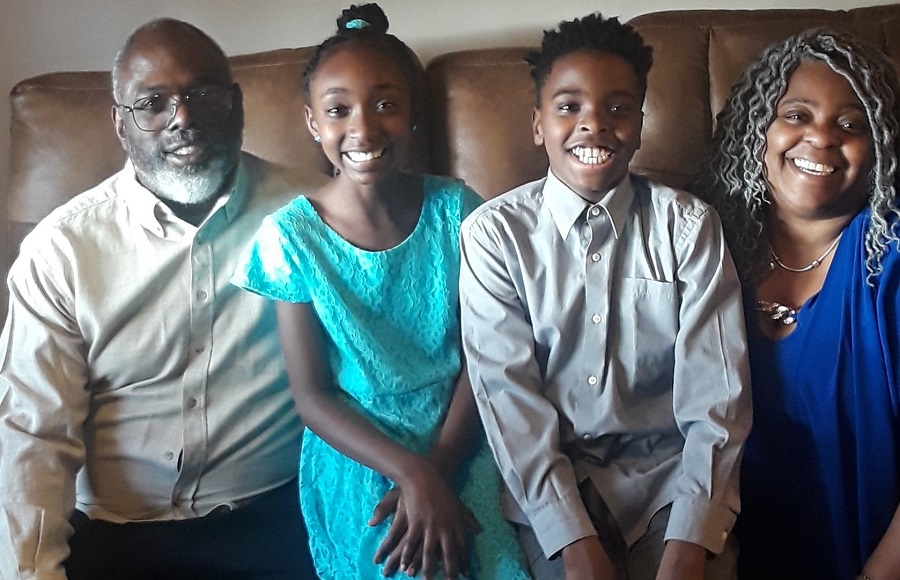
Reshell & Freddie Wilson care for their two grandchildren and have been active members of Atlantic Street Center’s Kinship Care Support Program.
Kinship care, by definition, is caring for a relative’s child or children. The actuality brings emotional, financial, and economic complexity. Nothing is clear or guaranteed. The majority of the parents are unable to care for their children due to mental illness, drugs, death or incarceration. Plans made by parents now without custody are cut short, older relatives assume new responsibilities, and young children attempt to understand a new reality. The path towards stability is shaky so our team at Atlantic Street Center (ASC) has included within our mission to ensure our neighbors have proper resources and supportive people at an arm’s length, even now in a must-be virtual world.
Becoming a caregiver is not often done on purpose. Like anything unexpected, a series of events leads to children needing to be cared for by someone other than their birth parents. According to AARP,1 an estimated 3 million older adults nationwide are the primary caretakers for their grandchildren or kin. In Washington State alone, 44,000 children are cared for primarily by kinship caregivers.2
And while Washington foster parents can receive financial assistance of at least $6723 for each child, kinship caregivers receive $4174 for the first child in their home from Temporary Assistance for Needy Families (TANF).
“They sacrifice their life,” says Mary Mitchell, one of Atlantic Street Center’s trailblazers of the Kinship Care Support Group. “They keep these children because they love them and want to keep them in the family. Many kinship caregivers are on fixed income but want to keep their children out of foster care.”
Like many adults her age, Mary Mitchell was looking forward to retiring; she had been working for the United States Postal Service. Her plans to retire started forming in January of 2010. Three months later in March, she found out she would need to be the primary guardian for her two granddaughters. They would remain in her custody for more than two years.
It was only afterwards that Mitchell volunteered and then worked part-time with Atlantic Street Center when she learned of the Kinship Care Support Group. It had been a resource to many kinship caregivers and their children for about twenty years and regularly meant once a week.
Fortunately, Mitchell’s grandchildren were reunited with their biological parents after 2 ½ years. This does not happen that often. Many of the children in the ASC Kinship have been cared for by their relative from birth to adulthood. Mitchell then became a volunteer Kinship Support Group Leader for Atlantic Street Center for a year, then was hired for the position. She recently retired from the position after serving for six years.
“ASC Kinship group is the largest in King County,” she says. “And we gained more people through COVID even though we were meeting remotely. At one point, we were serving 32 families.”
Mitchell mentions the group would meet outside a few times throughout the pandemic, but as this population is the most vulnerable to COVID, they continue to meet virtually. Still, while most kinship support groups would meet once a month, Atlantic Street Center would continuously meet every single week giving both adults and children a consistent place to find emotional support and fiscal resources.
The meetings, when in person, always have meals and activities for the attending children. Some meetings would host clothing exchanges, notable speakers, field trips, and access to resources outside the organization like food vouchers and clothing stores.
“When the pandemic started,” Mitchell recalls, “Atlantic Street Center really jumped in and helped families out with food. I began to order food from Walmart and let families know they could pick up their groceries. Plus, kids were home more [and] not getting lunches from school. We provided vouchers and gift cards for quite a few months.”
Atlantic Street Center also gave students school supplies, including Kindles so they could effectively participate in class while still working from home.
“If the state would treat kinship like it does foster families when it came to assistance,” says Mitchell, “a lot more relatives would be able to keep children out of foster care.”
She emphasizes the mental support many of the group members receive from one another and how valuable it is, especially in the darkest of times.
“A few days before Christmas, a member had a fire in her apartment unit so she had to move. The group got together, and everyone donated different things to get back on her feet. We miss each other.”
So how can you help Atlantic Street Center continue to provide resources to its kinship caregivers? Other than a few local grants, including Best Starts for Kids, there are few consistent financial opportunities to grow general kinship support groups. All resources come from in-kind and monetary donations. Since we are still remote, those types of assistance are the absolute best possible for helping these families. You can see below the best places to donate gift cards from. When you make a donation on our website here, make sure to indicate you want it to go towards our Kinship Care Support Group. And when we finally do go back to meeting in person, volunteers to help prep meals or set up the meeting rooms are always in high demand.
If you or someone you know is a kinship caregiver, have them reach out to us here to learn more about how Atlantic Street Center is here to help them and their children. 
- AARP, Grandparents Report Success in Raising Grandchildren (2018)
- Kinship Care in Washington State (2020)
- Washington State Department of Children and Families
- Temporary Assistance for Needy Families, Washington LawHelp, 2021
Get to Know Kinship at Atlantic Street Center
